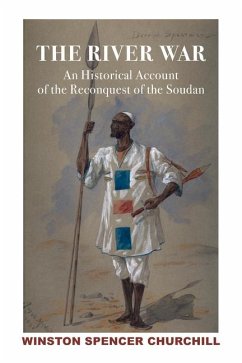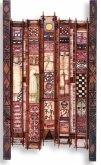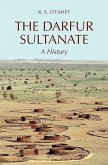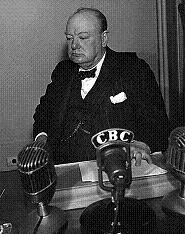Winston Churchill wrote five books before he was elected to Parliament at the age of twenty-five. The most impressive of these books, The River War tells the story of Britain's arduous and risky campaign to reconquer the Sudan at the end of the nineteenth century. More than half a century of subjection to Egypt had ended a decade earlier when Sudanese Dervishes rebelled against foreign rule and killed Britain's envoy Charles Gordon at his palace in Khartoum in 1885. Political Islam collided with European imperialism. Herbert Kitchener's Anglo-Egyptian army, advancing hundreds of miles south along the Nile through the Sahara Desert, defeated the Dervish army at the battle of Omdurman on September 2, 1898. Churchill, an ambitious young cavalry officer serving with his regiment in India, had already published newspaper columns and a book about fighting on the Afghan frontier. He yearned to join Kitchener's campaign. But the general, afraid of what he would write about it, refused to have him. Churchill returned to London. With help from his mother and the prime minister, he managed to get himself attached to an English cavalry regiment sent to strengthen Kitchener's army. Hurriedly travelling to Egypt, Churchill rushed upriver to Khartoum, catching up with Kitchener's army just in time to take part in the climactic battle. That day he charged with the 21st Lancers in the most dangerous fighting against the Dervish host. He wrote fifteen dispatches for the Morning Post in London. As Kitchener had expected, Churchill's dispatches and his subsequent book were highly controversial. The precocious officer, having earlier seen war on two other continents, showed a cool independence of his commanding officer. He even resigned from the army to be free to write the book as he pleased. He gave Kitchener credit for his victory but found much to criticize in his character and campaign. Churchill's book, far from being just a military history, told the whole story of the Egyptian conquest of the Sudan and the Dervishes' rebellion against imperial rule. The young author was remarkably even-handed, showing sympathy for the founder of the rebellion, Muhammad Ahmed, and for his successor the Khalifa Abdullahi, whom Kitchener had defeated. He considered how the war in northeast Africa affected British politics at home, fit into the geopolitical rivalry between Britain and France, and abruptly thrust the vast Sudan, with the largest territory in Africa, into an uncertain future in Britain's orbit. In November 1899, The River War was published in "two massive volumes, my magnum opus (up to date), upon which I had lavished a whole year of my life," as Churchill recalled later in his autobiography. The book had twenty-six chapters, five appendices, dozens of illustrations, and colored maps. Three years later, in 1902, it was shortened to fit into one volume. Seven whole chapters, and parts of every other chapter, disappeared in the abridgment. Many maps and most illustrations were also dropped. Since then the abridged edition has been reprinted regularly, and eventually it was even abridged further. But the full two-volume book, which is rare and expensive, was never published again--until now. St. Augustine's Press, in collaboration with the International Churchill Society, brings back to print in two handsome volumes The River War: An Historical Account of the Reconquest of the Soudan unabridged, for the first time since 1902. Every chapter and appendix from the first edition has been restored. All the maps are in it, in their original colors, with all the illustrations by Churchill's brother officer Angus McNeill. More than thirty years in the making, under the editorship of James W. Muller, this new edition of The River War will be the definitive one for all time. The whole book is printed in two colors, in black and red type, to show what Churchill originally wrote and how it was abridged or altered later. For the first time, a new appendix reproduces Churchill's Sudan dispatches as he wrote them, before they were edited by the Morning Post. Other new appendices reprint Churchill's subsequent writings on the Sudan. Thousands of new footnotes have been added to the book by the editor, identifying Churchill's references to people, places, writings, and events unfamiliar to readers today. Professor Muller's new introduction explains how the book fits into Churchill's career as a writer and an aspiring politician. He examines the statesman's early thoughts about war, race, religion, and imperialism, which are still our political challenges in the twenty-first century. Half a century after The River War appeared, this book was one of a handful of his works singled out by the Swedish Academy when it awarded Churchill the Nobel Prize for Literature in 1953. Now, once again, its reader can follow Churchill back to the war he fought on the Nile, beginning with the words of his youngest daughter. Before she died, Mary Soames wrote a new foreword, published here, which concludes that "In this splendid new edition...we have, in effect, the whole history of The River War as Winston Churchill wrote it--and it makes memorable reading."
Hinweis: Dieser Artikel kann nur an eine deutsche Lieferadresse ausgeliefert werden.
Hinweis: Dieser Artikel kann nur an eine deutsche Lieferadresse ausgeliefert werden.

Winston Churchills "Kreuzzug gegen das Reich des Mahdi" als Fortsetzungsroman in der F.A.Z.
Ein gutes halbes Jahrhundert bevor er den Nobelpreis für Literatur erhält, entschließt sich Winston Churchill, am Feldzug des britischen Empire gegen den Mahdi teilzunehmen. Der junge Buchautor, ein glänzendes, vor Brillanz und Ehrgeiz vibrierendes journalistisches Temperament, dem politische Ambitionen nachgesagt werden, ist soeben aus Indien nach England zurückgekehrt. Aber obwohl Premierminister Gladstone, der Churchills Buch "The Story of the Malakand Field Force" über den Konflikt an der Grenze zu Afghanistan gelesen hatte, dem Oberkommandierenden in Sudan einen Wink gibt, lässt Sir Herbert Kitchener den jungen Churchill abblitzen. Kitchener, so schreibt Georg Brunold, wollte Churchill offenbar bei der Schlussetappe des Krieges am Nil nicht dabeihaben.
Aber Churchill setzt sich durch. Als Kavallerie-Leutnant der 21st Lancers schifft er sich am 30. Juli 1898 in Marseille ein, und zwei Monate später unternimmt er mit den Lancers in der legendären Schlacht von Omdurman den letzten Angriff der Kavallerie in der Geschichte des britischen Empire. Während Churchill, noch keine vierundzwanzig Jahre alt, dem Feind entgegenreitet, mähen die neuen Maschinengewehre der Marke Maxim den Feind reihenweise nieder. Innerhalb von fünf Stunden werden 9700 feindliche Soldaten getötet, das sind zweiunddreißig pro Minute: Der moderne Krieg, der Krieg der Massenvernichtung, hat begonnen. Die einzige britische Einheit, die bei Omdurman nennenswerte Verluste erleidet, ist die Churchills. Er selbst erschießt innerhalb von Sekunden drei mit blankem Säbel heranstürmende Derwische mit seiner Mauser-Pistole: "Wie einfach, einen Menschen zu töten", wird er in seinem Buch "My Early Life" darüber schreiben.
Wie zuvor in Indien und wenig später in Südafrika bewährt sich der Kriegsberichterstatter Churchill als mutiger Soldat. Seine Bücher machen ihn berühmt - und seine Taten legitimieren seine Bücher. Als er im Jahr 1900 als jüngster Abgeordneter des Unterhauses eine Vortragsreise in den Vereinigten Staaten antritt, stellt ihn Mark Twain dem New Yorker Publikum als "Held von fünf Kriegen, Autor von sechs Büchern und künftigen Premierminister von England" vor. Georg Brunold fügt den Worten Mark Twains eine höchst aufschlussreiche Selbstbeschreibung Churchills hinzu, fünf Jahre später zu Papier gebracht: "Wir alle sind Würmer, doch ich glaube, ich bin ein Glühwurm."
Man mag es kaum glauben, doch Winston Churchills Buch "Kreuzzug gegen das Reich des Mahdi", erschienen unter dem Titel "The River War" im Jahr 1899, wird dem deutschen Publikum jetzt zum ersten Mal präsentiert. Heute beginnen wir mit dem Vorabdruck der ersten deutschen Übersetzung dieses Werkes, das in Kürze in der "Anderen Bibliothek" erscheinen wird, übersetzt von Georg Brunold, dem früheren Afrika-Korrespondenten der "Neuen Zürcher Zeitung".
Wenn Brunold von dem Iraner Jamal ad-Din al-Afghani, dem ersten modernen islamischen Berufsrevolutionär, berichtet oder den Gottesstaat des Mahdi in Sudan als panislamische internationalistische Bewegung charakterisiert, hat das nichts mit Aktualitätshascherei zu tun. Im Gegenteil: Brunold ist überzeugt, dass es hilfreich ist, sich die historischen Wurzeln gegenwärtiger Phänomene vor Augen zu führen: "In der Religion des Islam wurde das moderne Vehikel der politischen Massenmobilisierung entdeckt, und sein unschätzbarer Vorzug war die Waffe des Martyriums mit der ihr eigenen Schlagkraft." Mohammed Ahmed, der Mahdi, der zum heiligen Krieg, zum Dschihad, aufrief und den islamischen Gottesstaat in Sudan errichten wollte, ist mit den gewaltbereiten Dschihadisten unserer Tage auf mannigfache Weise verbunden. Wie die Gotteskrieger der Gegenwart gründete der Mahdi seinen Machtanspruch auf den vollständigen Macht- und Autoritätsverlust aller Tradition. Seine Vision war ein erdumspannender Gottesstaat, eine Vision allerdings, die Churchill nicht übermäßig ernst nahm.
Dass die Gotteskrieger an vielen Orten der damaligen Welt die kolonialistische europäische Expansion störten, nahm er so nüchtern in den Blick wie Großbritanniens Interessen im vom Mahdi bedrohten Ägypten und die der britischen Nord-Süd-Ausbreitung in Afrika entgegenstehenden französischen Pläne einer Ost-West-Ausdehnung. Heute ist China der wichtigste Geschäftspartner Sudans, und das Land von der Größe Westeuropas ist die einzige staatliche Bastion der islamisch-fundamentalistischen Weltbewegung. Die islamische Theokratie, die dort nach dem Staatsstreich von 1989 errichtet wurde, ist eine rassistische Militärdiktatur, wie sie schon der Mahdi auf erstaunlich modern anmutende Weise anstrebte. In Churchills Schilderung, die wir in Auszügen von heute an vorabdrucken, begegnet uns ein wichtiges Kapitel der Vorgeschichte heutiger Konflikte, geschrieben von einem der schärfsten Beobachter und glänzendsten Stilisten seiner Zeit.
HUBERT SPIEGEL
Alle Rechte vorbehalten. © F.A.Z. GmbH, Frankfurt am Main









